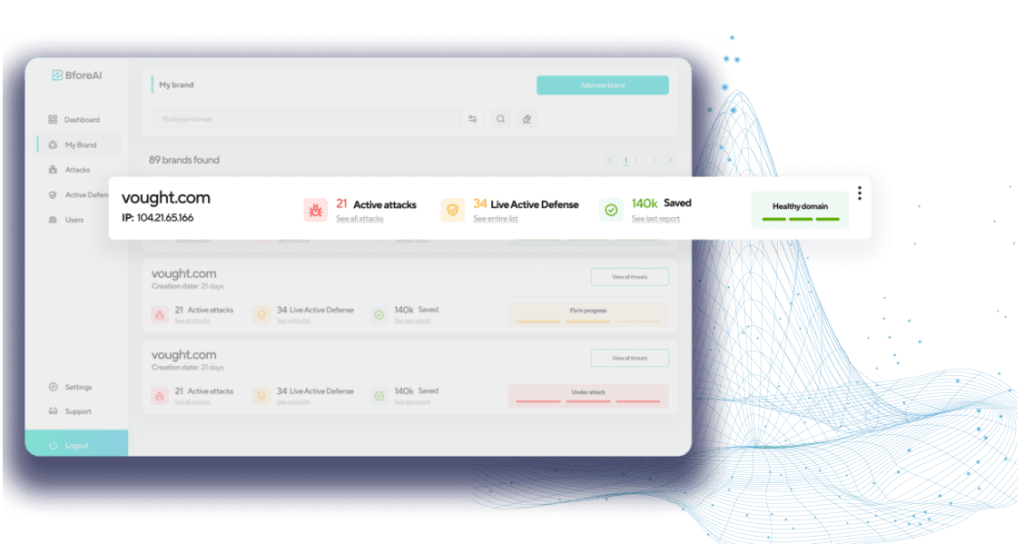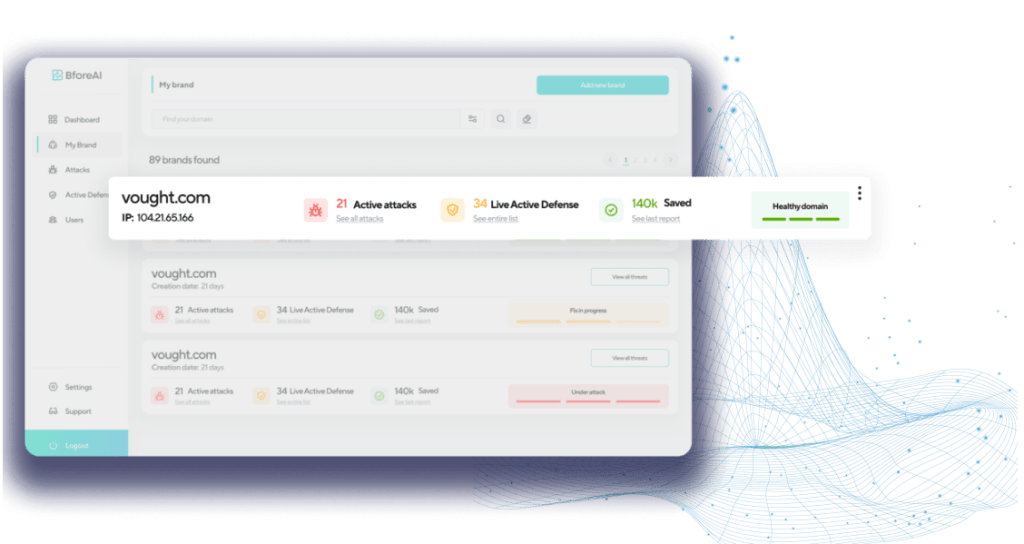
H-1B Domain Activity and U.S. Migration Trends Following Trump’s $ 2025-10-8 15:33:3 Author: bfore.ai(查看原文) 阅读量:11 收藏
H-1B Domain Activity and U.S. Migration Trends Following Trump’s $100,000 H-1B Visa Fee Announcement

Executive Summary: Surge in H-1B Visa Scams and Domain Fraud After Fee Announcement
Date: October 2025
Author: PreCrime Labs, BforeAI
Following the September 19, 2025 U.S. administration proclamation requiring that a $100,000 fee be paid at the time of petitioning for an H-1B visa, the threat landscape surrounding U.S. visa support has shifted notably. This change has precipitated an unprecedented surge in the registration of suspicious domains mimicking official, legal, or support services for H-1B visas, many clearly intended for fraud, phishing, or commercial exploitation.
Domain Scam Spike Following $100,000 H-1B Fee Announcement
Observed Registration Trends (August–September 2025):
- More than 60 domains were registered in the days immediately following the proclamation.
- Registrations cluster around keywords: “h1b”, “usvisa”, “visacenter”, “support”, “apply”, “extension”, “returns”, “slots”, “updates”, “help”, connected to the visa process or likely scams.
- The highest density of new domains occurs on and after 2025-09-19, with most set to expire in 2026 or later, suggesting intent for prolonged abuse.
Registrar & TLD Patterns in Fraud Domains:
- Registrars most used: GoDaddy.com, LLC, Squarespace Domains LLC, NameCheap Inc, Dynadot Inc, Porkbun, Cloudflare, Spaceship Inc, and regional platforms (Netim, Sav.com, Alibaba Cloud).
- Abused TLDs: .info, .com, .net, .online, .gallery, .xyz, .help, .icu, .asia, .store, .work—attackers favor non-standard, cheap, and privacy-friendly extensions.
- Notable clusters: Same-day batch registrations of “h1bblocked.com”, “h1bsupport.com”, “h1bsupportnetwork.com”, “h1bumble.com”, “h1boys.com”, “h1brides.com”—likely from automated scripts or coordinated attackers.
Motivations and Risks Behind the H-1B Visa Domain Scam Surge
Fee-driven panic/urgency:
The $100K fee triggers fear and urgency among applicants—ripe conditions for social engineering and fraud.
- Fake application sites: Collect applicant data (passport, payment, SSN).
- Support scams: Offer “expedited processing”, “legal review”, or “legal help” with steep upfront charges.
- Phishing attacks: Steal credentials for direct financial fraud, ransom, or resale.
- Victims often lose personal data/money, fall prey to identity theft, or face delays in legitimate visa processing.
- U.S. immigration agencies have reported a dramatic uptick in attempted phishing, fake conferences, and legal services scams since the fee announcement.
Example Suspicious Domains: Patterns, Registrars, and Predicted Use (Observed)
| Domain | Registrar | Created | Comments (predictions) |
|---|---|---|---|
| h1bpay.info | Namecheap Inc. | 2025-08-03 | Payment bait, fake processing |
| touristvisausa.com | Namecheap Inc. | 2025-09-17 | Fake tourist visa support |
| h1baware.com/h1beware.com | GoDaddy.com, LLC | 2025-09-19 | Fear-mongering, urgency scams |
| h1blocked.com | Namecheap Inc. | 2025-09-20 | Claims to protect applicants |
| h1bsupport.com | GoDaddy.com, LLC | 2025-09-20 | Fake help/support |
| h1brides.com | Cloudflare, Inc. | 2025-09-21 | Social engineering angle |
| globalvisabusiness.com | GoDaddy.com, LLC | 2025-09-17 | Legitimate lookalike |
| trumpplatinumvisa.com | GoDaddy.com, LLC | 2025-09-22 | Politically motivated scam bait |
Pattern: domains target real pain points, urgent emotions, and fee panic.
Key Metrics and Trends: Tracking the Scale of the H-1B Visa Domain Scam Wave
- Peak daily registrations: Up to 10 domains per day after the fee news.
- Registrar clustering: 35% GoDaddy, 30% Squarespace, 15% Namecheap.
- TLD use: 50% .com, 20% .info/.online/.xyz, 10% .help/.gallery/.icu.
See table below for breakdown:
| Domain | Registrar | Created |
|---|---|---|
| GoDaddy.com, LLC | 22 | .com, .help, .work |
| Squarespace | 12 | .com, .net, .org |
| Namecheap Inc. | 7 | .info, .xyz, .com |
| Others | 18 | Mixed |
Interesting Examples: Keyword Ambiguity and Brand Misuse in Visa Scams
Misuse of “Visa” Branding and Payment Logos in Phishing Sites
Most of the domains that we observed remained under construction, loaded the default registration page, or were parked, indicating the use of the domain would be done when the time is right to cause maximum impact. Interestingly, as the H-1B visa is also read with a hyphen “-” sometimes, many domains appeared with the same combination.

“Slot” and “Return” Keyword Abuse in H-1B Scam Campaigns
As mentioned in our previous report on Business Email Compromise, “Visa” is a commonly occurring and prominent keyword in the travel and finance industry, creating ambiguity. In the example below, we identified a U.S. visa-related domain that displays the Visa payment platform logo and gives the impression of a slot-booking service. However, the use of the keyword “slot” is ambiguous, as it is also commonly associated with the gaming and gambling industry.

Community Sites and Satire Platforms Masking Scam Operations
Another notable case was the so-called “homecoming hub,” a site portraying itself as a community for people returning to India while simultaneously mocking the current U.S. visa situation through memes and satire. Although framed as inspirational for returnees, the platform leans heavily on witty commentary and satire, which risks crossing into insensitive portrayals of the U.S. and its representatives.

Recommendations: How to Mitigate H-1B Visa Scam and Domain Fraud Risks
For government agencies and organizations:
- Issue official advisories and active warnings against third-party “agents” promising quick schemes or unofficial visa extensions.
- Preemptively monitor visa-themed malicious domains in real time and focus on taking necessary mitigation measures.
- Organizations are advised to share Indicators of Compromise (IoCs) with Computer Emergency Response Teams (CERTs) and law enforcement globally for rapid takedowns.
- Government, travel agencies, and visa support companies can maintain internal help desks to answer H-1B/visa-related questions to avoid interested parties reaching out to shady agencies.
- Actively monitor brand mentions and visa keywords to detect phishing pages impersonating the organization.
- Users coming across phishing domains, contact numbers, or suspicious emails should report them to consulates, government cyber cells, and CERTs.
- All visa-related inquiries should be checked through the U.S. Dept. of State official visa portal or authorized VAC centers.
- Be cautious of sites using keywords like “slot,” “urgent,” “appeal,” or “verify” with unusual TLDs (.vip, .top, .xyz).
- Never click visa links sent via WhatsApp, Telegram, or email forwards.
- Avoid sharing payment details with any website that asks for “deposits”, “payment processing fees”, or any other payment aside from the specified fees.
Explore our latest PreCrime™ Labs report:
Suspicious Domain Activity in Lead up to 2026 FIFA World Cup Tournament
Phishing Campaign Imitating U.S. Department of Education G5
Ready to see BforeAI in action?
Get a personalized demo
Talk to one of our experts and deploy in minutes.
No implementation needed. Works right out of the box!

如有侵权请联系:admin#unsafe.sh